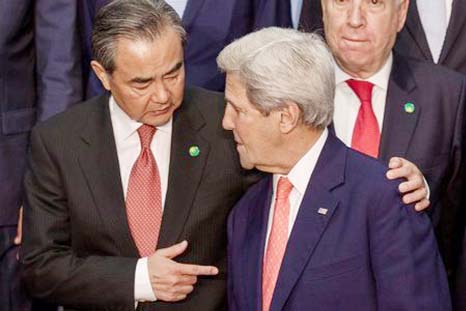
Reuters, Beijing :The United States should not interfere in China’s internal affairs on matters related to Tibet, China’s Foreign Minister Wang Yi told U.S. Secretary of State John Kerry in a phone call on Saturday.According to an account of the call posted on the Chinese foreign ministry website, Kerry reaffirmed that there was no change in the U.S. policy that Tibet is a part of China and that the U.S. does not support Tibetan independence.The phone call follows on from President Barack Obama’s meeting with the exiled Tibetan spiritual leader, the Dalai Lama, last week at the White House despite China warning it would damage diplomatic relations.China views the Dalai Lama as a dangerous separatist. The meeting came at a time of already heightened tensions between the U.S. and China over Beijing’s pursuit of territorial claims in East Asia.On the call, Wang and Kerry also discussed the success of the recently concluded bilateral Strategic and Economic Dialogue in Beijing, according to the foreign ministry posting, which did not give specifics.Meanwhile, Chinese authorities have announced the destruction of thousands of monastic dwellings and expulsion of monks, nuns and lay practitioners at Serthar Larung Gar Buddhist Institute, the famed Tibetan Buddhist religious encampment located in Serthar (Ch: Seda) County in Kardze (Ch: Ganzi) Tibetan Autonomous Prefecture, Sichuan Province, in eastern Tibet.An eight-point document issued by the Chinese authorities spells out the step-by-step guide to demolishing housing facilities of thousands of monks, nuns and lay practitioners and their expulsion, so as to reduce the number of residents to government-set ceiling of 5000. Citing the decisions taken at the Sixth Tibet Work Forum Conference and the Second National Work Conference on Religion, the document stated that the demolition order was aimed at proper regulation and management of Larung Gar Buddhist institute. Mainly prefecture-level departments under the direction of mostly Han Chinese officials would carry out the demolition order.In 2001, Chinese authorities implemented similar crackdown on Larung Gar by destroying thousands of monastic dwellings and expulsion of monastic and lay practitioners, some of whom died of shock or resorted to suicide, while some were rendered mentally unsound. Khenpo Jigme Phuntsok, the charismatic founder of Larung Gar Buddhist Institute later died under mysterious circumstances at a Chinese government hospital in Chengdu.The recent four-page demolition order requires relevant departments including the management and administrative bodies of Larung Gar to reduce the number of residents to 5000 before 30 September 2017. The order further requires that the number of demolished dwellings be equal to the number of expelled monastic or lay practitioners, and to ensure that both numbers are strictly compared and accounted for. The document then calls for clear separation between monastic and lay practitioners and between the monastery and the institute; and implementation of social management and provision of social services within the Larung Gar community.

